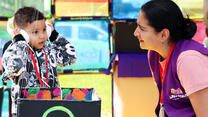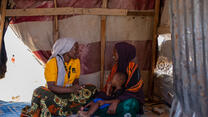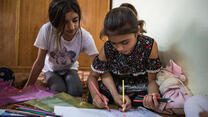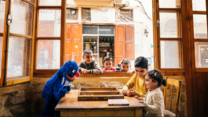
Since fighting broke out in Syria in 2011, more than 5 million children have had to flee their homes; 2.8 million children remain out of school. Many have been exposed to extreme violence and experienced unspeakable trauma that will have lasting impact on their health and future.
The International Rescue Committee and Sesame Workshop are working together to give millions of refugee and displaced children in Syria, Jordan, Lebanon and northern Iraq the support they need to learn, grow and thrive.
“From home visits, to preschool classrooms, to health clinics and women’s protection centres, the IRC has been integrating Ahlan Simsim content into programming for refugee children and their caregivers wherever they are,” said Jamie Weiss-Yagoda, IRC senior policy advisor, education.
Here’s how we're changing the lives of young refugees and displaced children across the Middle East:

New Muppets comforting and educating displaced children
Sesame Workshop, the nonprofit educational organisation behind Sesame Street, partnered with the IRC to launch a new Arabic-language TV programme for children in Jordan, Lebanon, Iraq and Syria coping with conflict and displacement.
Called ‘Ahlan Simsim,’ which means “Welcome Sesame” in Arabic, the show features familiar friends Elmo, Cookie Monster and Grover, as well as new Muppets with stories and experiences refugee children can relate to: Jad, who had to leave his home; Basma, who befriends the newcomer; and Ma’zooza, a baby goat who follows Jad and Basma everywhere.
The first ‘Ahlan Simsim’ season will focus on understanding and managing emotions that refugee children experience, such as anger, fear, frustration and loneliness. These coping skills form a crucial developmental foundation for all young children, but especially those who have experienced the trauma of war and displacement.
Helping parents interact with their children through “Reach Up and Learn”
Decades of research have produced effective techniques to support parents raising children in challenging environments. Through a program called “Reach Up and Learn,” the IRC trains volunteers from the local community to visit families and demonstrate for parents how to use play as part of early learning.
Volunteers like Anas*, a Syrian refugee in Jordan, help children ages 6 months to 3 years build the confidence they need to thrive. The volunteers bring picture books, puzzles and toys made from recycled and low-cost materials, tools that also help children develop language and motor skills. Some of the educational materials are related to the ‘Ahlan Simsim’ show.
In places like northwest Syria, where millions have had to flee from intense bombardment, these visits offer both children and volunteers, many themselves displaced, a vital respite.
Creating safe spaces for children to learn and make friends
At IRC-run women’s centres and health centres in the Zaatari and Azraq camps in Jordan, trained volunteers from the local community facilitate play and learning activities for children while parents attend English classes, recreational classes or medical appointments.
Alaa*, a young Syrian father, volunteers at the IRC parents’ centre in Azraq camp. There he shows parents and caregivers ways to more effectively engage and support their children as they play and learn. Volunteers like Alaa also incorporate stories and Arabic songs from the ‘Ahlan Simsim’ curriculum. Children will watch segments of the TV show, then discuss what they’ve learned through an age-appropriate activity.
“I love what I do and I do it for the community, for the children,” Alaa says. “This type of play is so joyful. We’re building a cycle of education. Children are trying to [forget] the past, which has given them so much trauma.”

Developing literacy, numeracy, and social-emotional skills in the classroom
The IRC early-childhood development program in Lebanon, Jordan, Syria and Iraq is designed to help prevent and reduce “toxic stress”—a biological response to prolonged and severe adversity that disrupts a child’s healthy brain development—by providing displaced children with a safe and stable environment, nurturing care, and learning opportunities.
Learning essential social and emotional skills along with language, reading and math skills helps children control their emotions, resolve conflict, and have positive interactions. It also helps them persevere through times of crisis.
For Hasina and Mohammad, who live in Azraq camp, play-based learning has been indispensable for their children. “Play is like medicine for my children,” says Mohammed. “For most children, it’s fun to play—but for my children, it’s a need.”

*Last names omitted for privacy reasons



